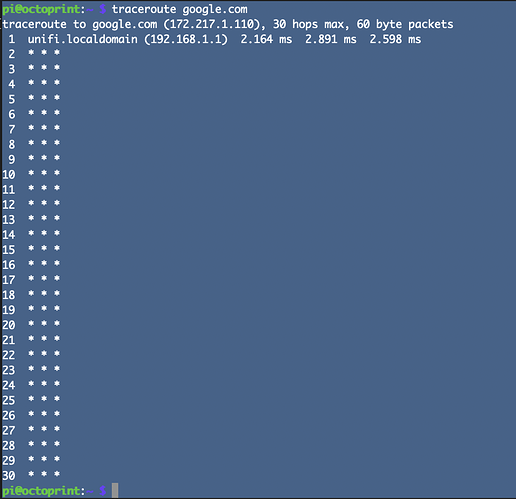What is the problem?
So I built my Voron 2.4 about a month ago and everything worked just fine. Then, I woke up one day and I could not connect to the printer wirelessly anymore. The IP address shows up and everything but it is unable to connect unless I put a LAN cable between my PC and the Pi.
I tried pinging google and it said "ping: google.com: Temporary failure in name resolution"
I tried setting a static IP through the "dhcpcd.conf" file as well as the router's IP and the DNS
I set the network it was on to 2.4 GHz.
I have a Verizon router, everything is updated, but I know relatively little about Octoprint aside from about 10 hours of trouble shooting.
Here's the dhcpcd.conf file:
A sample configuration for dhcpcd.
See dhcpcd.conf(5) for details.
Allow users of this group to interact with dhcpcd via the control socket.
#controlgroup wheel
Inform the DHCP server of our hostname for DDNS.
hostname
Use the hardware address of the interface for the Client ID.
clientid
or
Use the same DUID + IAID as set in DHCPv6 for DHCPv4 ClientID as per RFC4361.
Some non-RFC compliant DHCP servers do not reply with this set.
In this case, comment out duid and enable clientid above.
#duid
Persist interface configuration when dhcpcd exits.
persistent
Rapid commit support.
Safe to enable by default because it requires the equivalent option set
on the server to actually work.
option rapid_commit
A list of options to request from the DHCP server.
option domain_name_servers, domain_name, domain_search, host_name
option classless_static_routes
Respect the network MTU. This is applied to DHCP routes.
option interface_mtu
Most distributions have NTP support.
#option ntp_servers
A ServerID is required by RFC2131.
require dhcp_server_identifier
Generate SLAAC address using the Hardware Address of the interface
#slaac hwaddr
OR generate Stable Private IPv6 Addresses based from the DUID
slaac private
static IP configuration:
interface wlan0
static ip_address=192.168.200.6
static routers=192.168.1.1
static domain_name_servers=8.8.8.8 8.8.4.4
It is possible to fall back to a static IP if DHCP fails:
define static profile
#profile static_eth0
#static ip_address=192.168.1.23/24
#static routers=192.168.1.1
#static domain_name_servers=192.168.1.1
fallback to static profile on eth0
#interface eth0
#fallback static_eth0
